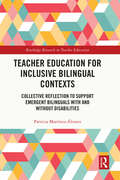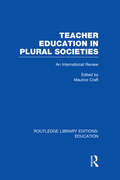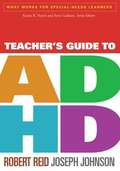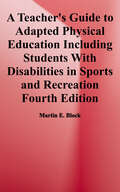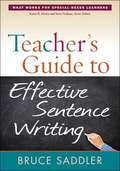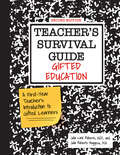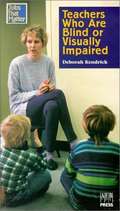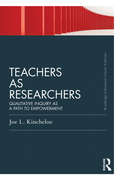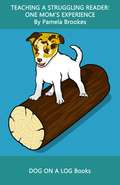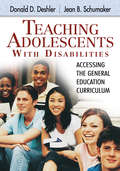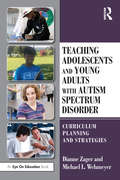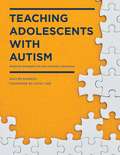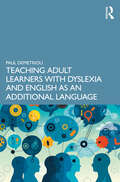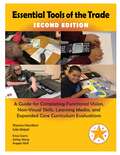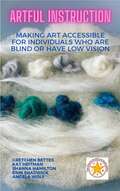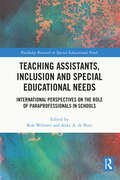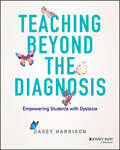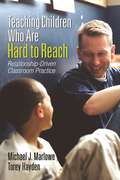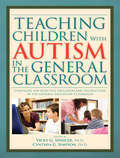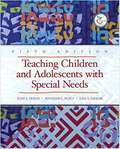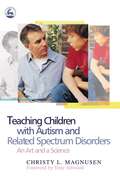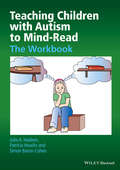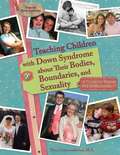- Table View
- List View
Teacher Education for Inclusive Bilingual Contexts: Collective Reflection to Support Emergent Bilinguals with and without Disabilities (Routledge Research in Teacher Education)
by Patricia Martínez-ÁlvarezThis text demonstrates how collective reflection can function as a central part of effective teacher preparation for work in inclusive bilingual environments. Through analysis of rich qualitative data, Teacher Education for Inclusive Bilingual Contexts shows how group reflection supports pre-service educators to recognize the intersectional challenges faced by students, and understand their identities beyond the confines of disability. This, in turn, engenders reconceptualization of standardized expectations and implicates the educator in developing student agency through individualized use of routine, language, and materials. The author offers Cultural Historical Activity Theory (CHAT) and Disability Studies in Education (DSE) as a basis for dialectal interactions to unearth contradictions and misunderstandings surrounding language acquisition and the learning of emergent bilinguals, and highlight the ways in which educators can disrupt oppressive practices through expansive learning practices. This insightful volume will be of interest to researchers, scholars, and postgraduate students in the fields of inclusive education and disability studies, bilingual and language education, and teacher education.
Teacher Education in Plural Societies: An International Review (Routledge Library Editions: Education)
by Maurice CraftThe educational implications of cultural pluralism attracted a good deal of attention in Western societies in the 1970s and 1980s, on the grounds of equality and human rights, maximising national talent, and maintaining social cohesion. Maurice Craft and the international contributors to this book highlight the potential of teacher education, and in this wide-ranging analytical review for its key role in providing for ethnic minority children, in respect of access and achievements, and also for all children to acquire informed and tolerant attitudes. This book makes an important contribution to a small but growing literature, concentrating on initial rather than in-service teacher education, and it brings together papers from experienced specialists from eleven countries worldwide: Australia, Britain, Canada, Israel, Malaysia, Northern Ireland, South Africa, Spain, Sweden, The Netherlands and the USA. The papers are concerned with the needs both of diverse classrooms and diverse societies, and also consider general principles and comparative perspectives. Of interest to the specialist and non-specialist alike, Teacher Education in Plural Societies: An International Review deals with an important and timely issue – how best to prepare teachers to meet the needs of both minority – and majority – culture pupils who are growing up in plural societies.
Teacher's Guide to ADHD
by Joseph Johnson Robert ReidMeeting a key need for teachers, this book provides practical, data-based tools for helping students with attention-deficit/hyperactivity disorder (ADHD) succeed in the classroom. The authors combine instructional expertise with extensive knowledge about the nature and treatment of ADHD. Coverage includes ways to support students and teach them needed strategies in core areas: academic skills, behavior, self-regulation, and social skills. Step-by-step instructions and concrete examples help teachers implement effective interventions and accommodations. The book also offers crucial guidance for teaming with other school professionals and with parents.
Teacher's Guide to Adapted Physical Education: Including Students with Disabilities in Sports and Recreation
by Martin E. BlockA healthy and active lifestyle for all students: That's the promise of physical education, and the goal of this comprehensive textbook. Now in a thoroughly updated fourth edition, this text prepares current and future PE teachers to lead welcoming, inclusive classes where every student participates, makes friends, and learns new skills and values. K - 12 physical educators will get cutting-edge research and guidance on inclusive education, concrete strategies for planning and implementing an adapted PE program, and valuable disability-specific information. An essential resource for preparing both general PE teachers and adapted PE teachers, this text will provide a solid foundation for gym classes that meet every student's needs. This new edition has: 9 chapters on teaching students with specific disabilities, making it an ideal text for APE courses; more student-friendly features including updated tips and reproducible forms for planning and teaching, chapter objectives, additional resources, and more case studies; and more photos and illustrations throughout the book to emphasize key points.
Teacher's Guide to Effective Sentence Writing
by Bruce SaddlerThis practical book provides explicit instructions for teaching sentence-level skills to students who have difficulties in this area. The author explains the key role of sentence combining in the writing process and presents effective techniques for instruction and assessment. Numerous sample lessons, practice activities, planning tips, and grammatical pointers make it easy for teachers to incorporate sentence combining and construction into the writing curriculum at all grade levels (2-12). Accessible and engaging, the book helps teachers and students experiment with different ways to arrange thoughts and produce meaningful written work.
Teacher's Survival Guide: A First-Year Teacher's Introduction to Gifted Learners
by Julia Roberts Julia Roberts BoggessTeacher's Survival Guide: Gifted Education is packed with practical information, up-to-date resources, tips for success, and advice from experts in the field. This updated second edition:Is the perfect introduction to gifted education for beginning and early career educators.Provides field-tested, proven strategies.Is designed to help teachers build their understanding of gifted education and gifted learners.Covers topics essential to gifted education teachers, including identifying giftedness and encouraging creativity.Includes tips for providing resources and opportunities to spur talent development.Each chapter features a key question, making the book ideal for an engaging book study, as well as survival tips and a survival toolkit of resources to keep readers on course as they navigate through gifted ed.
Teachers Who Are Blind or Visually Impaired
by Deborah KendrickThe first volume in the Jobs That Matter series, Teachers Who Are Blind or Visually Impaired profiles 18 visually impaired individuals who have successfully fulfilled their dreams of becoming teachers. Included in this volume are educators of different ages, ethnic backgrounds, and geographic locations across the United States, who work in the classroom in ways that are both surprisingly similar and dramatically different from one another. These engaging individuals demonstrate how visually impaired teachers can be effective in their jobs and achieve classroom success and satisfaction. Designed to inspire young people who are blind or visually impaired, their families, and the professionals who work with them about careers that are available, the books in the Jobs That Matter series are meant to expand readers' horizons by showing a wide range of employment possibilities.
Teachers as Researchers: Qualitative inquiry as a path to empowerment (Teachers' Library)
by Joe L KincheloeTeachers as Researchers urges teachers - as both producers and consumers of knowledge - to engage in the debate about educational research by undertaking meaningful research themselves. Teachers are being encouraged to carry out research in order to improve their effectiveness in the classroom, but this book suggests that they also reflect on and challenge the reductionist and technicist methods that promote a 'top down' system of education. It argues that only by engaging in complex, critical research will teachers rediscover their professional status, empower their practice in the classroom and improve the quality of education for their pupils. Now re-released to introduce this classic guide for teachers, the new edition of Teachers as Researchers now also includes an introductory chapter by Shirley R. Steinberg that sets the book within the context of both the subject and the historical perspective. In addition, she also provides information on some key writing that extends the bibliography of this influential book thereby bringing the material fully up to date with current research. Postgraduate students of education and experienced teachers will find much to inspire and encourage them in this definitive book.
Teaching A Struggling Reader: One Mom's Experience (DOG ON A LOG Books #1)
by Pamela BrookesThere are a lot of children (and adults) who struggle with reading. Some are helped by their schools, some are not. <P><P>In this short booklet, Pamela Brookes shares some of the basic information she wishes she’d had when she was first trying to figure out how to help her child learn to read. <P><P>Teaching A Struggling Reader is filled with links to informational and product resources for parents or teachers. It is geared to people who want to educate themselves in the methods that are effective in teaching those with a dyslexic learning style. It also contains photos demonstrating basic techniques like “Tapping” (using one’s fingers to aid in sounding out words) and “Making your bed” to differentiate between “b” and “d.” <P><P>The focus of this book is the reading process. However, since many dyslexic readers also struggle with math, there is a brief description of how the dyslexic brain comes to understand math. There is also a link to a blog by Dr. Meg Burke of Dyslexia Pros. She is a dyslexic learner with a PhD in math education who is dedicated to helping her students attain fluency in math. <P><P>This is a booklet that can be read in one sitting. However, there are ample links to provide an even greater experience.
Teaching Adolescents With Disabilities: Accessing the General Education Curriculum
by Don Deshler Jean SchumakerAligned with the Individuals with Disabilities Education Act and No Child Left Behind Act requirements, this comprehensive guide empowers teachers and administrators with research-validated practices and interventions that can close the general-curriculum performance gap and break down the barriers to academic success for middle and high school students with disabilities. This insightful resource features: Practical planning advice, teaching practices, and learning strategies for inclusive classrooms Methods for designing instructional materials Tips for effectively leveraging technology Strategies for transition beyond high school Real-life examples and illustrations
Teaching Adolescents and Young Adults with Autism Spectrum Disorder: Curriculum Planning and Strategies
by Michael L. Wehmeyer Dianne ZagerTeaching Adolescents and Young Adults with Autism Spectrum Disorder supports teachers in preparing secondary students with autism spectrum disorder (ASD) to succeed in school, work and beyond. Focused on enabling students to successfully pursue further education and meaningful career paths, chapters incorporate person-centered, student-directed planning into instructional programming throughout the text. Featuring helpful vignettes to demonstrate concepts in action, curriculum areas address community living skills, academics, social communication and interaction, and career preparation. Grounded in current research and Universal Design for Learning practices, this guide is an essential resource for educators, therapists, and anyone seeking to create fluid, adaptable programs for students with autism spectrum disorders.
Teaching Adolescents with Autism: Practical Strategies for the Inclusive Classroom
by Walter KaweskiAward-winning educator Walter Kaweski offers secondary teachers practical strategies and heartfelt insights based on his extensive experience as an autism specialist, inclusion coordinator, and father of a son with Asperger syndrome. Students with special needs often require extra support as they adjust to middle and high school and the changes that accompany adolescence. Without support, this time can be overwhelming. Teaching Adolescents with Autism offers hundreds of valuable ideas to help teachers: Understand the causes and manifestations of autism Solve adolescent behavior challenges Support students with diverse needs Implement academic and behavioral interventions Help students adjust to social situations Understand special education policyEach chapter offers numerous personal stories that illustrate and reinforce strategies in a tangible way. Important concepts are augmented with bulleted lists, tables, figures, photographs, and cartoons drawn by a student with autism. This unique book takes the mystery out of teaching adolescents with autism and inspires teachers to appreciate the individuality of each student.
Teaching Adult Learners with Dyslexia and English as an Additional Language: Practical Tips to Support Best Practice
by Paul DemetriouPacked full of practical tips to use in the classroom, case studies to provide theoretical grounding and ideas to improve inclusion, Teaching Adult Learners with Dyslexia and English as an Additional Language covers all the key areas necessary to ensure inclusive and effective teaching practice in higher and further education settings. This book provides a coherent framework for those looking to develop their knowledge and skills in this challenging area and explores key areas such as: teaching and learning strategies, differentiation, assessment, feedback and supporting students using technology. It provides a unique insight into how to develop a thorough understanding of the needs of learners and the principles and practices of how to meet those needs within a classroom setting. This is an essential introductory book for anyone working or training to work in either Further or Higher Education and who wishes to develop knowledge and skills in the challenging area of supporting and teaching adult EAL learners with learning differences.
Teaching Age-Appropriate Purposeful Skills Part 3 Appendices
by Debra Sewell Rona Pogrund Heidi Anderson Lisa Calaci [et al.]An Orientation & Mobility Curriculum for Students With Visual Impairments 3rd Edition
Teaching Age-Appropriate Purposeful Skills: Comprehensive Initial and Ongoing Evaluation
by Debra Sewell Rona Pogrund Heidi Anderson Lisa CalaciA comprehensive evaluation tool is designed to be used by trained orientation and mobility specialists to identify a student's current functioning level in all areas of orientation and mobility in order to determine student needs for programming
Teaching Age-Appropriate Purposeful Skills: Street Crossings for Travelers Who Are Visually Impaired
by Linda Myers Wendy SchiffersIt helps travelers lower the inherent risk in crossing streets. Travelers who learn and apply this information will be safer and better able to travel independently in familiar and unfamiliar areas with less need for mobility instruction in the future.
Teaching Age-Appropriate Purposeful Skills: The Curriculum)
by Debra Sewell Rona Pogrund Heidi Anderson Lisa Calaci Mary Faith Cowart Carolina M. Gonzalez Ruth Ann Marsh Burnsteen Roberson-SmithAn Orientation and Mobility curriculum for teachers and specialists to help visually challenged students realize a fundamental right to independent and fulfilling life : being able to travel whenever and wherever an individual wants to go.
Teaching Assistants, Inclusion and Special Educational Needs: International Perspectives on the Role of Paraprofessionals in Schools (Routledge Research in Special Educational Needs)
by Rob Webster Anke A. de BoerThis book offers the first collection of international academic writing on the topic of Teaching Assistants. It serves as an indicative summary of current research and thinking in this field and as a point of departure for future research and development. With contributions from leading researchers, the book draws together empirical work on the deployment and impact of Teaching Assistants from various perspectives and from a range of methodological approaches. It highlights and celebrates the vital everyday contributions Teaching Assistants make to their schools and their communities: from their role within classrooms, to their moment-by-moment interactions with pupils and teachers. The book examines the effect that Teaching Assistants can have on pupils’ learning and wellbeing, and considers issues of overdependence on classroom paraprofessionals and the unintended consequences to which this can lead. Bringing together work from a journal special issue with brand new and updated chapters, the contributions offer insight into the liminal space between educator, care-giver, behaviour manager, and facilitator of learning and of peer relations, which characterises the Teaching Assistant role. This timely and important book will be essential reading for academics, researchers and students interested in special educational needs, disability, and inclusion, and those interested in the wider topic of paraprofessionals in labour markets.
Teaching Beyond the Diagnosis: Empowering Students with Dyslexia
by Casey HarrisonTips for tailoring instruction and meeting the needs of dyslexic learners Looking through both academic and social-emotional lenses, this book will deepen your understanding of dyslexia and help you feel confident in your interactions and implementation of instruction with your dyslexic learners. Written for educators and schools looking for ways to meet the social and emotional needs of dyslexic learners, scaffold instruction, and successfully implement accommodations, Teaching Beyond the Diagnosis provides a concrete framework for promoting self-confidence and student success. Author Casey Harrison, creator of The Dyslexia Classroom, shares her unique approach to creating dyslexia-friendly classrooms, providing accommodations and in the moment scaffolds as well as helping students build self-advocacy skills. This book will allow you to: Meet the needs of dyslexic learners both academically and emotionally Understand what dyslexia is, how it impacts learning, and what implications it has beyond the reading classroom Learn research-based techniques to enhance, differentiate and scaffold instruction, promoting learning in students with dyslexia Develop empathy and understanding, both in yourself and in the broader educational community, and promote inclusive classrooms This book is for anyone who wants to help students with dyslexia find self-confidence and success: K-12 educators, as well as parents, administrators, and aspiring teachers.
Teaching Children Who Are Hard to Reach: Relationship-Driven Classroom Practice
by Torey Hayden Michael J. MarloweCreate lasting, positive change for our most troubled students! How do you move beyond traditional classroom management to create a learning environment that engages our hardest-to-reach students—students who may be struggling due to emotional disturbances, disabilities, or environmental circumstances? Marlowe and Hayden have the answer: through a relationship-driven classroom. With the help of their book, you will: Gain a meaningful understanding of troubled students and how to reach and teach them Learn how to change inappropriate behavior rather than just control it Develop the essential skills for building successful classroom relationships Become more reflective about teaching and learning with challenging children
Teaching Children With Autism in the General Classroom
by Vicky G. Spencer Cynthia G. SimpsonSuccessful strategies for educating students with autism in the regular classroom. Recent special education legislation has led to a rise in inclusion classrooms, where students with special needs, including autism spectrum disorders, are taught alongside their nondisabled peers. Teaching Children with Autism in the General Classroom provides an introduction to inclusionary practices that serve children with autism, giving teachers the practical advice they need to ensure each student receives the quality education he or she deserves. Promoting field-tested strategies and techniques, this book offers teachers sound advice for creating a classroom environment conducive to learning success for children with autism spectrum disorders. The easy-to-use tips and tools included also aide teachers in organizing and managing their classrooms to maximize instruction for students of all ability levels. Detailed resource guides and concise overviews of special education legislation also are provided to give general education teachers a solid background of knowledge about autism and the needs of students with the disorder.
Teaching Children and Adolescents with Special Needs
by Judy L. Olson Jennifer C. Platt Lisa A. DiekerWith collaboration so vital to today's educational arena, this thorough, well-organized, highly readable text concentrates on the general process of teaching—the basic “how to do it”—to help prospective teachers of children with mild disabilities in grades K–12 learn to work effectively with students, other teachers, and families. Basing coverage on their extensive experience, the authors present practical, research-based teaching strategies that relate to everyday occurrences in schools; provide motivating, experience-based activities; and offer numerous detailed lesson plans. Their personal, conversational writing style makes even complex concepts accessible, while their extensive coverage gives readers a solid understanding of what works and what doesn't in both special education classrooms and inclusive settings. For future teachers of elementary school students with mild disabilities and learning problems.
Teaching Children with Autism and Related Spectrum Disorders: An Art and a Science
by Anthony Attwood Christy MagnusenBased on twenty-five years of teaching and working with children who have Autism Spectrum Disorders (ASDs), Christy L. Magnusen contends that it is those teachers who can blend the 'science' of education methodology with the 'art' of teaching who are best able to reach these children. Examining both these aspects of teaching, she takes a fresh look at established and more recent teaching methods such as structuring spaces, emphasizing language and planning strategies for transition and generalization, and then explores the art of implementation: why, when and how these techniques should be applied. By highlighting workable solutions to everyday problems, and emphasizing that teachers need to understand techniques and have the ability to adapt them to the situation that faces them, this book will be invaluable to all those involved in teaching children with ASDs.
Teaching Children with Autism to Mind-Read
by Simon Baron-Cohen Julie A. Hadwin Patricia HowlinThis workbook expands upon the authors? Teaching Children with Autism to Mind-Read: A Practical Guide to present the most effective approaches, strategies, and practical guidelines to help alleviate social and communication problems in individuals with Autism Spectrum Disorders (ASD).Complements the best-selling Teaching Children with Autism to Mind-Read: A Practical Guide for use in practical settingsAnswers the need for more training of professionals in early interventions for children assessed with ASD called for by the National Plan for AutismWritten by a team of experts in the fieldCovers issues such as how to interpret facial expressions; how to recognize feelings of anger, sadness, fear and happiness; how to perceive how feelings are affected by what happens and what is expected to happen; how to see things from another person?s perspective; and how to understand another person?s knowledge and beliefs
Teaching Children with Down Syndrome about Their Bodies, Boundaries, and Sexuality: A Guide for Parents and Professionals
by Terri CouwenhovenParents of children with Down syndrome and other intellectual disabilties are accustomed to paying close attention to their child's physical, cognitive, and emotional development. This proactive approach should also include their child's sexual development, which for many parents may not seem as obvious or urgent, especially to those with young children. Drawing on her unique background as both a sexual educator and mother of a child with Down syndrome, the author blends factual information and practical ideas for teaching children with Down syndrome about their bodies, puberty, and sexuality. This book gives parents the confidence to speak comfortably about these sometimes difficult subjects. In an easy-to-read, non-clinical style, the book covers relevant issues and concerns for children of all ages, such as: labelling & explaining private body parts; Identifying & expressing emotions; Respecting personal space; Teaching self-care & hygiene; Understanding norms of privacy; Understanding gender identity; Showing appropriate levels of affection. It also covers issues that affect teenagers and young adults, including: Anticipating and understanding puberty; Dealing with periods, bras; Experiencing erections, wet dreams; Relating to the opposite sex; Sharing parental values about sexuality; Explaining sexual relationships; Preventing sexual abuse; Understanding how Down syndrome affects puberty & fertility rates. Each chapter highlights important points with key messages, teaching activities, parental pauses, and anecdotes, all of which prompt readers to stop and consider concepts or values associated with a particular topic. The final chapter covers the special concerns of parents who are now teaching teenaged or adult children about sexuality for the first time. It concludes with extensive appendices containing invaluable teaching materials and illustrations of body parts and functions.
